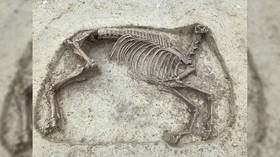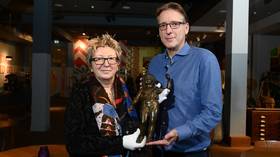Archeologists find horse beheaded in ‘unknown burial ritual’

German researchers found skeletal remains of a decapitated horse along with a man presumed to have been its owner in an early medieval graveyard in Knittlingen, Germany.
The bones were buried about 1,400 years ago during the reign of the Merovingian dynasty (A.D. 476-750). Their reign extended over large parts of France and Germany, before they were replaced by the Carolingians, the most famous monarch of whom was Charlemagne.
Archeologists do not know the exact reason why the horse was beheaded, but there is speculation that it might have been part of an unknown burial ritual. It is unlikely to be a sacrifice, since the people in the area had already been converted to Christianity by the time the burial was made. The horse’s head was not found at the cemetery.
According to the press release, made by the Stuttgart Regional Council, the graves on the Knittlingen burial site belonged to the most respected members of medieval society, as the scientists can judge by the “relatively rich” gold jewelry, bowls, weapons, and animals buried alongside the corpses as grave goods. Despite the damage done by an ancient robbery, it is possible to determine the social status of the dead.
The beheaded horse was found next to a man buried with his weapon, who was allegedly its owner. The man is believed to have served the Merovingian kings. “He stood in a ‘chain of command’ with the Merovingian kings on its top, which meant he was obliged to participate in the king’s campaigns,” Folke Damminger, the archeologist in charge of the excavation site, said, as cited by Live Science.
Grave goods are often found in early medieval graveyards. However, a horse skeleton buried alongside its owner is a rare find.
The excavations at the Knittlingen medieval cemetery began last August and are scheduled to continue until spring 2022. The skeletons, along with other findings, are taken to the central archive in Rastatt.














